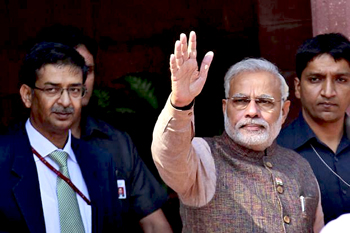
Modi left by a special Air India plane for Nay Pyi Taw on the first leg of his 10-day, three-nation tour that will also take him to Australia, where he will attend the G-20 meet, and Fiji.
"ASEAN is at the core of our Act East Policy and at the centre of our dream of an Asian century, characterised by cooperation and integration," the Prime Minister said before his departure.
Modi said he was looking forward to discussing with ASEAN leaders how to take "our relationship to a new level, which will supplement our deepening bilateral ties with each member".
The Prime Minister will meet over 40 leaders from countries in Asia, Africa, Europe, North America, South America and Pacific Region during the India-ASEAN and East Asia summits on November 12-13 in Myanmar's capital Nay Pyi Taw, the G 20 Summit in Brisbane and the visit to Fiji Islands.
Noting that no other region in the world embodies so much dynamism or faces so many challenges as the region spanning the Indian Ocean, continental Asia and Pacific Ocean, he said the East Asia Summit has the potential to shape this region and the world's future.
"At the East Asia Summit, I look forward to discussing with ASEAN and seven global leaders how we can strengthen regional institutions, international norms and regional cooperation in pursuit of peace, stability and prosperity," the Prime Minister said in a statement.
On the sidelines of the international summits in Myanmar, Modi is slated to meet Russian Prime Minister Dmitry Medvedev, South Korean President Park Geun-hye and Singapore President Tony Tan, besides the host President Thein Sein.
The ASEAN members are Brunei, Cambodia, Indonesia, Laos, Malaysia, Myanmar, Singapore, Thailand, Philippines and Vietnam, while the EAS members 10 ASEAN nations and Australia, China, Japan, New Zealand, South Korea, Russia and the US.
At the G-20 Summit, the Prime Minister said, highlighting the importance of international cooperation against black money would be a key issue.
He will also discuss with other leaders ways to accelerate the creation of next generation infrastructure, which also includes digital infrastructure, and ensure access to clean and affordable energy.
The Prime Minister noted that G-20 countries account for 85 per cent of the world's economic output and it is a key forum to coordinate activities and pursue collective action to support global economic growth and stability, stable financial markets and global trading regimes and employment generation.
Modi will also have bilateral talks with Australian Prime Minister Tony Abbott in Canberra after the G20 summit. He will be the first Indian Prime Minister to visit Australia in 28 years since Rajiv Gandhi in 1986.
"While we have much in common with Australia, our political, strategic and economic relations have been below potential," he said.
Pitching for closer strategic partnership with Australia, he said it will support India's economic goals, "promote our security interests, including maritime security, and reinforce our efforts to foster a climate of peace and stability in our extended continental and maritime neighbourhood."
The four-city, three-day visit from November 16 covers Melbourne and Sydney besides Melbourne and Canberra.
Referring to his day-long visit to Fiji on November 19, Modi said it will be his privilege to visit that country, with which India shares "historical and ethnic links', soon after the return of democracy in September this year.
"We also owe them a debt of gratitude for hosting our scientists on the island in support of our Mars Mission," Modi, who will be meeting leaders and representatives of 12 Pacific Island nations, said.
Modi will be the first Indian Prime Minister to visit Fiji after a gap of 33 years, the first being Indira Gandhi in 1981. He will have talks with Premier Frank Bainimarama.
Out of the 849,000 population in Fiji, 37 per cent people are of Indian origin. Many Indians arrived in Fiji as indentured labour in the 19th century.
He said said he was looking forward to a future of regular engagement and more robust cooperation with Fiji and other Pacific Island countries.








Comments
Add new comment